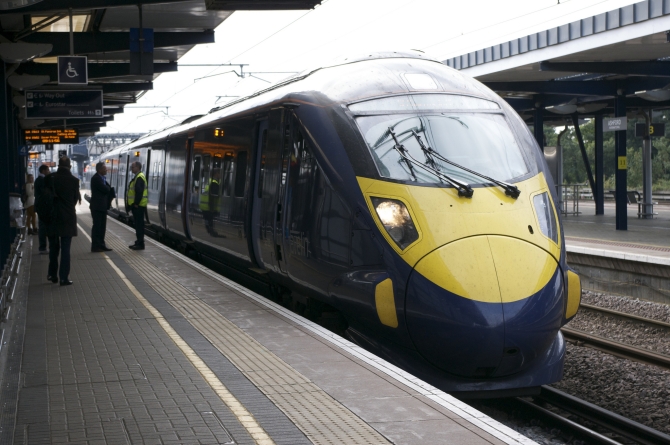In a pioneering move for any Japanese company, electronics giant Hitachi has confirmed it is moving its global rail business to Britain. Consolidating both manufacturing and management in the UK should allow the train maker to boost its revenue by as much as £1bn.

Work is already underway on the construction of Hitachi’s £82m plant at Newton Aycliffe, County Durham, from where it plans to deliver more than 860 next generation carriages as part of a £1.2bn deal it signed last July.
The factory — less than 10 miles from the 1825 route of the world’s first passenger railway — will create 730 jobs when production begins in two years’ time with an initial batch of Japanese-built carriages arriving in 2015 for testing and evaluation. The first 122 trains to be built at the plant will be used to revamp Britain’s 40-year-old high-speed train fleet. All the Class 800 series trains have been assigned to the East Coast Main Line and the Great Western Main Line as part of the Government’s Intercity Express Programme.
Now, in a strategic move which puts it geographically nearer to Siemens of Germany, its main train-building rival, Hitachi says it’s looking for London offices to house its entire Tokyo-based rail division. The move should also allow it to lift its revenue from £1.5bn to £2.5bn over the next few years. It has already said it expects to increase its workforce from 2,500 to nearer 4,000.
There is also a political element to the Japanese company bringing its rail business to Britain, a move many see as an attempt to boost Hitachi’s credentials in the continuing wrangle over rail contracts being awarded to foreign firms. It may also be a pre-emptive bid to build the 180mph trains for the Government’s controversial £50billion HS2 line.
The Government described the move as a huge vote of confidence in Britain, its workforce and its rail industry. A sentiment echoed by Alistair Dormer, chief executive of Hitachi’s rail systems business, when he said: “Both the UK and Japan remain important as markets for Hitachi Rail, and with our train factory in the North-East of England now under construction, we will work to realise our export potential from the UK, expanding into Europe and emergent markets.”
Hitachi — which manufactures everything from nuclear power plants to televisions — was persuaded to shift its rail manufacturing division to County Durham after the Department for Business, Innovation and Skills pumped £4m into the project under its Grant for Business Investment scheme. “I don’t want the North-East to just have an industrial heritage,” transport secretary Patrick McLoughlin said at the time. “I want it to have an industrial future.”
Hitachi Rail Europe is working with Merchant Place Developments to build and fit out its new production plant, which covers an area bigger than six football pitches. When complete the 43,000sq metre Merchant Park factory will be the biggest development in County Durham for more than 20 years.
There will also be other job securing spin-offs when train making starts in 2016, including long-term contracts for Romag, in Leadgate, County Durham, which makes and repairs train windows; Nomad Digital, of Newcastle, which designs and makes driver reminder safety switches, and Gateshead-based Petards, which produces passenger counting equipment.
Previous Post
Investors sought for £4bn Brent Cross Redevelopment